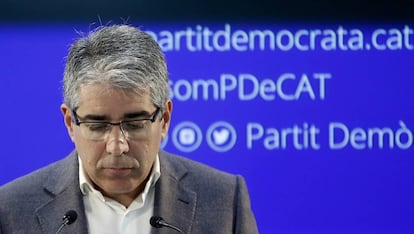Ex-official faces nine-year ban from office over Catalan independence poll
Prosecutors want Francesc Homs to stand trial for disobeying the Constitutional Court’s orders
The Spanish Supreme Court’s prosecutors office wants a former Catalan government official to be barred from holding office for nine years over his role in organizing an informal independence vote on November 9, 2014. The regional poll had been expressly prohibited by Spain’s Constitutional Court, but it went ahead anyway with a majority of participants voting to break from Spain.

Prosecutors on Wednesday formally requested the initiation of trial proceedings against Francesc Homs, who was then head of the Catalan Presidency Department and the regional government spokesman.
He is being charged with one count of serious disobedience and one count of prevaricación administrativa, an abuse of office that occurs when a public official knowingly issues an unlawful order.
Homs was “fully aware that his actions were in violation of his duties to obey the decisions of the Constitutional Court”
Homs, who is currently a deputy for the Catalan Democratic Party (PdeCAT), heir to the old Convergence and Union (CiU), is not the only former official to face the law over the November 2014 poll. Artur Mas, then the regional premier, and two former top aides have also answered questions in court in connection with the case.
The prosecutor’s brief says that Homs “did not adopt the suspension of any of the acts or events being carried out with a view to holding said consultation, and which depended directly on the Presidency Department that he was heading.”
Instead, Homs is described as “actively supporting the preparatory work” for the non-binding vote.
Homs’ argument
Homs has argued that the Catalan regional government was no longer involved in the ballot after the Constitutional Court veto came into effect on November 4, and that it was then organized by volunteers. Prosecutors claim, however, that private companies tasked with the organization continued to operate after that time, carrying out work that included mass-mailing campaigns, the maintenance of websites dedicated to the vote, and IT tasks.
Some of these actions included putting his department’s legal experts at the service of the CTTI, the technology center that provided tech support for the poll. He also sent a letter to the head of T-Systems, a company tasked with creating the computer programs necessary to conduct the vote, assuring him that the Constitutional Court’s ban did not affect them, and that they should carry on with their work.
Homs was “fully aware, particularly as the head of the Generalitat’s legal services, that his actions were in violation of his duties to obey the decisions of the Constitutional Court.”
The prosecutor’s brief comes two weeks after the judge in charge of the case, Andrés Palomo, ended the preliminary investigation and concluded that there are grounds to charge Homs, who disobeyed the Constitutional Court’s orders in an “open, obstinate and pertinacious” manner.
English version by Susana Urra.
Tu suscripción se está usando en otro dispositivo
¿Quieres añadir otro usuario a tu suscripción?
Si continúas leyendo en este dispositivo, no se podrá leer en el otro.
FlechaTu suscripción se está usando en otro dispositivo y solo puedes acceder a EL PAÍS desde un dispositivo a la vez.
Si quieres compartir tu cuenta, cambia tu suscripción a la modalidad Premium, así podrás añadir otro usuario. Cada uno accederá con su propia cuenta de email, lo que os permitirá personalizar vuestra experiencia en EL PAÍS.
¿Tienes una suscripción de empresa? Accede aquí para contratar más cuentas.
En el caso de no saber quién está usando tu cuenta, te recomendamos cambiar tu contraseña aquí.
Si decides continuar compartiendo tu cuenta, este mensaje se mostrará en tu dispositivo y en el de la otra persona que está usando tu cuenta de forma indefinida, afectando a tu experiencia de lectura. Puedes consultar aquí los términos y condiciones de la suscripción digital.









































